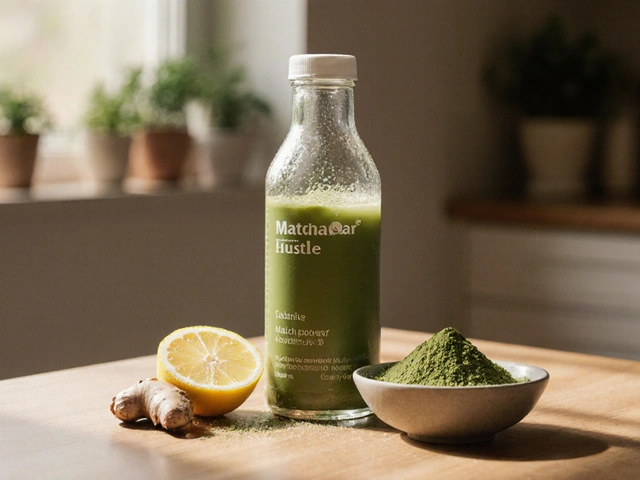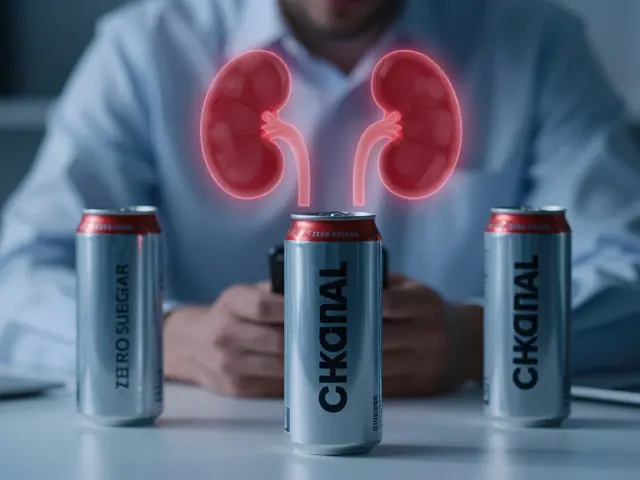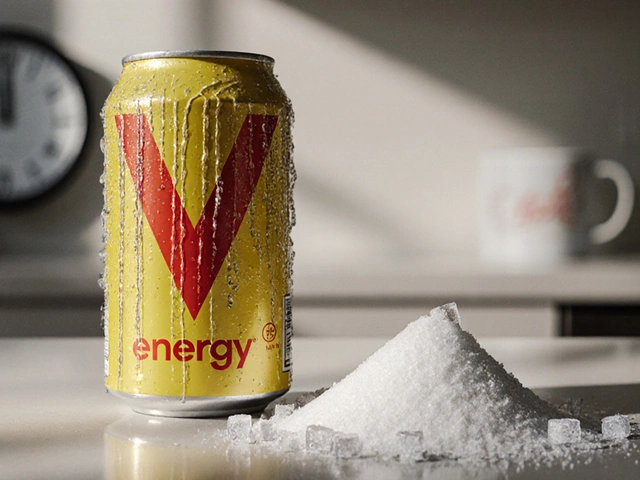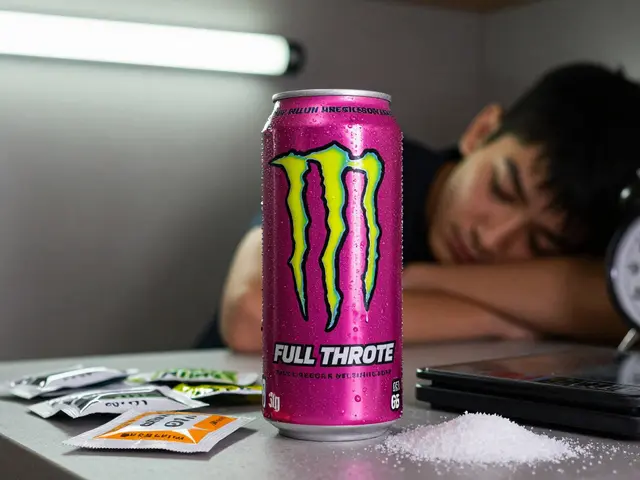Unlocking Energy: What Your Body Burns First

Okay, picture this: you're just about to hit the gym or go for a run. Ever wonder what your body grabs first for energy? It's like picking out the prime snack from your cupboard – your body does the same with fuel. Let's break it down.
The first go-to for energy is carbohydrates. It's like grabbing that quick-acting energy bar. Carbs are our body's preferred energy source because they're easy to break down into glucose, which your muscles love. Especially if you're doing high-intensity activities, this is what gives you that burst of energy to keep going.
But what if there aren't enough carbs? Your body then turns to fats, which are perfect for steady, longer-lasting energy. Think of them as your body's slow-cooked meal, offering enduring fuel when you're doing lower-intensity or prolonged activities like marathons or long cycles.
- Fuel Priorities: What Comes First?
- Carbohydrates: The Quick Fix
- Fats: The Endurance Powerhouse
- Proteins: The Muscle Support
- Choosing the Right Energy Drink
Fuel Priorities: What Comes First?
So, when you're getting ready to unleash your inner athlete, what does your body unlock to fuel that energy first? Well, it all starts with carbohydrates. Your body loves them because they're like the convenient fast-food option that gets to work fast. Carbs break down into glucose, which is super easy for your muscles to gobble up and use when you're pumping up the adrenaline.
Now, here's a fun fact to chew on: your body stores some of these carbs as glycogen in your muscles and liver. Think of it like having a secret stash of candy bars tucked away for when you need them most. And when you're working hard, your body starts tapping into that stash to keep the engine running smoothly.
But what if your carb stash is low? Enter fats. They're the backup dancers, stepping in when your primary energy source runs low, especially during long, steady activities rather than short spurts. Fats are the go-to for those marathon sessions when you're in it for the long haul.
And if both carbs and fats are on the downside, your body might reluctantly turn to protein. But let's be honest, proteins are more like the support crew, focusing more on muscle repair and building than providing energy.
- Priority 1: Carbohydrates
- Priority 2: Fats
- Enters the support act: Proteins when absolutely necessary
Understanding how your body prioritizes these fuels helps you choose the right snacks and energy drinks to match your activity level, ensuring you're not just running on fumes.
Carbohydrates: The Quick Fix
When we're talking energy for athletes, carbohydrates are like the speed dial to your body’s energy line. Why? Because they break down into glucose, the easiest type of sugar for your body to use. For quick energy, nothing beats them.
Imagine you're sprinting or lifting weights. Your body needs fast energy to fuel those movements, and that's where carbs shine. They’re stored as glycogen in your muscles and liver, ready for action. In fact, during high-intensity workouts, your body can derive up to 80% of its energy just from this source!
Thinking about what to eat before a workout? Focus on easily digestible carbs. Here's a handy list of athlete favorites:
- Bananas - Perfect for a quick pre-workout boost.
- Oatmeal - Provides a steady release of energy.
- Rice cakes with honey - Light but effective fuel.
Worried about balance? Don't be. Even though they’re a quick fix, it's important to pair carbohydrates with a mix of proteins and fats in your daily diet for better long-term energy management.
To put it all in perspective, consider this: consuming 30-60 grams of carbs per hour during prolonged activities can maintain energy levels and improve performance. It’s a simple but powerful part of an athlete's energy plan, helping you push past that 'wall' we all dread.

Fats: The Endurance Powerhouse
Let's talk about fats. They're often misunderstood, but when it comes to endurance, they're your body's trusty sidekick. While carbs take the spotlight for quick bursts, fats have your back over longer plays. Picture this - during activities like marathons or long bike rides, when the pace isn’t insanely high, your body smartly starts tapping into your fat stores.
Here's a fun fact: one gram of fat gives around 9 calories, which is more than double what you get from carbs or protein. This makes fats super efficient for long-term energy. You might not feel the buzz fats provide immediately, but they're crucial for lasting effort. If you've ever gone low and slow during a workout, it’s fats that kept you moving.
So, what happens if you're out of carbs and still trucking along? Your body kicks fats into high gear, converting them into fatty acids and then into energy, all while sparing your precious muscle glycogen. That's why some athletes swear by fat-heavy diets like keto when doing endurance sports.
You might be wondering, where can I get these fats in my diet? Think fatty fish like salmon, nuts, seeds, and avocados as prime sources. They're packed with good fats and also super tasty!
So when you're gearing up for that long ride or climb, remember to balance your energy resources, and let fats power your endurance game without breaking a sweat.
Proteins: The Muscle Support
Now, what about proteins? If you're thinking about a fuel source, proteins aren't exactly in the spotlight. They're like the unsung hero—essential but not your body's first pick for energy. When it comes to helping those muscles recover and grow, though, proteins are the real MVPs.
Proteins come into play when you're seriously pushing your limits and your carbs and fats are running low. Picture this like an emergency reserve. But it's not the most efficient source of energy because breaking down proteins for fuel means your body might be sacrificing muscle tissue, which is not ideal, especially for athletes aiming for strength and endurance.
For athletes, proteins shine after the workout. They're critical for muscle repair and growth. We're talking amino acids, the building blocks of proteins, which help fix tiny muscle tears that happen post-exercise. Ensuring you get enough protein, whether through your diet or supplements, can make a significant difference in your recovery and performance.
Snack ideas or meals that include a blend of protein can enrich your routine. A serving of Greek yogurt, a handful of almonds, or a protein shake can do wonders post-workout. Plus, incorporating proteins helps sustain energy levels throughout the day, supporting overall recovery.
While protein isn't your body's go-to for fuel during exercise, it's absolutely vital for keeping those muscles happy and ready for the next challenge. The smart play? Balance your diet with a diverse range of foods so you're covered for both immediate energy and long-term muscle health.

Choosing the Right Energy Drink
Navigating the world of energy drinks can feel like walking into a candy store – so many colorful options, but which one actually works? Let's cut through the noise and figure out what you really need as an athlete.
First off, the main thing you want to look for in an energy drink is the carbohydrate content. Since carbohydrates are your body's fast fuel, an effective energy drink should have a good dose of them. This gives you that quick energy boost when you're in the middle of an intense workout.
Next up, check the caffeine levels. A little caffeine can enhance performance and alertness, but don't go overboard. Most experts suggest around 80-200mg per serving is ideal. Keep in mind that too much caffeine can lead to jitters or a crash later on.
Some energy drinks also include electrolytes, and that's great if you're sweating it out. These help maintain fluid balance, which is crucial for endurance events. Look for sodium and potassium on the label; these are the goodies that help replenish what's lost in sweat.
Also, consider the presence of vitamins like B6 or B12. These can support energy metabolism, although they might not make or break your performance.
A word of caution: always watch out for sugar content. While a bit of sugar can support your quick energy needs, too much can spike your blood sugar and lead to a crash. Balance is key.
Here's a quick guide to get you started on what to look for:
- Carbohydrates: Aim for 10-20g per serving for a quick energy boost.
- Caffeine: Keep it moderate, around 80-200mg.
- Electrolytes: Sodium and potassium should be present if you're really exerting yourself.
- Vitamins: Look for B6 and B12 for a metabolism boost.
- Sugar: Watch that it doesn't exceed your nutritional needs.
The next time you're choosing an energy drink, keep these tips in mind to ensure you're picking one that supports your workout, not just hyping you up. And hey, remember to stay hydrated alongside, because no drink replaces good old H2O!






Comments (10)
Liam Hesmondhalgh
18 Jul 2025
Finally, a post about something straightforward instead of all this fitness fluff. So your body's main go-to is carbohydrates, right? Makes sense since they're quick energy, but the article seems to gloss over how often people just think fat is bad. It’s not, it’s just a slower burn. I mean, doesn’t everyone know your body goes for carbs first when working out? It’s basic physiology.
Also, why don’t most people understand that proteins aren’t really for energy unless you’re starving? This stuff should be common knowledge these days. Maybe if people stopped guzzling sugary drinks and actually ate properly, they’d feel better during workouts. But nope, energy drinks are a crutch for most.
Anyway, doesn’t the post do a decent job explaining it? Maybe could use more scientific references but yeah, nice intro for the average gym goer.
Patrick Tiernan
18 Jul 2025
Yeah, but it’s way oversimplified. Like carbs are the first source for energy, sure, everyone knows that already. The article reads like a bland high school biology blurb, honestly. No nuance, no critical thinking. What about glycogen stores versus direct glucose usage? Or how fat metabolism varies based on individual conditioning? Not even touched.
Also, energy drinks? Might as well just say "don’t drink poison" and call it a day. They barely put anything scientific on that. And the tips are so generic like "eat smart" and "optimize energy." Ugh, I expected at least some depth but no, just surface level nonsense.
Not impressed. Give me something with data and less fluff next time.
Nikhil Gavhane
21 Jul 2025
I really appreciated this explanation. Sometimes it’s confusing to know what our body uses first when active, and this cleared up my doubts. The focus on carbohydrates makes sense, especially since they provide the quickest fuel source, which is why athletes carb-load before competitions.
That said, I think it’s important to remember that fats still play a huge role especially during prolonged, low-intensity exercise. Proteins being reserved mainly for muscle repair and not energy unless under extreme conditions was also a good point.
The mention of energy drinks was interesting, but I agree that one should be cautious with those. Really, balancing your diet with good food sources is far better for sustained energy. It’s helpful to know what your body prioritizes so you can fuel it properly.
Rajat Patil
26 Jul 2025
This post covers the basic insight very clearly. Our bodies first use carbohydrates because they are readily converted to glucose which fuels the muscles immediately during a workout. Then, as carbohydrate availability drops, fats become the main source of energy.
It is essential for athletes and people exercising regularly to understand this mechanism to adjust their diets accordingly and optimize performance. I found the article’s tips about smart eating particularly useful, recommending nutrient timing before workouts.
However, one must be cautious with energy drinks due to their sugar content and potential side effects. Overall, a good primer for novices seeking to improve their workout results through nutrition awareness.
deepak srinivasa
31 Jul 2025
Thank you for this interesting post. I have been curious about what happens inside the body when we start exercising, especially regarding the energy sources.
One question I have — does this fuel prioritization vary significantly depending on the type of workout? For example, high intensity versus endurance training? Also, how do individual factors like metabolism or diet impact this process? I wonder if everyone burns carbs first, or if there is some variability.
It would be great to see more detailed explanation or references on these points. Still, this is a very helpful start.
pk Pk
5 Aug 2025
Great post and really handy for those trying to up their fitness game. Knowing that carbs are burnt first definitely helps in planning meals and snacks pre and post workout.
I encourage everyone to remember that it’s not just what you eat but when you eat that fuels your energy well. Timing carbohydrates intake properly can optimize performance and recovery. Also, staying hydrated with the right fluids is crucial.
Energy drinks do have a place sometimes but should not replace a balanced diet. Supplements can't replace smart nutrition. Keep focusing on whole foods and give your body the proper fuel to perform at its best.
NIKHIL TRIPATHI
10 Aug 2025
The insights about the balance of carbs, fats, and proteins are quite accurate. I also liked how the post linked energy sources to eating and drinking habits. As someone who tries to follow a mixed diet, knowing that carbs are prioritized makes me focus on timing my meals better.
But I think the article could have acknowledged how some people peak on fat-adapted diets, where the body shifts to use more fat earlier. It’s quite relevant for endurance athletes or those doing keto.
Still, for most general readers, the explanations are clear and practical. It encourages learning more about the science behind energy utilization, which is excellent.
Shivani Vaidya
13 Aug 2025
This post is very well articulated and balanced in its approach. It helps the reader understand that carbohydrates are rightly the first source of energy as they are quickly metabolized.
Moreover, the emphasis on why energy drinks should be consumed cautiously reflects a considerate attitude towards health. Many overlook this, assuming quick sugar hits are good energy.
The tips for smart eating and hydration strategies were succinctly presented and quite easy to apply in everyday routine. Overall, educative and practical.
Rubina Jadhav
16 Aug 2025
I liked the simple way this was explained. Carbs first and then fats, proteins last for energy, makes it easy to remember. Not sure if many people realize that protein is really for repair more than fuel.
Could have used a little more on how energy drinks can mess with you if overused, like making you crash later or affecting hydration though. Just a small note.
Good post overall for those new to fitness, helps you learn how to eat properly before working out so you won’t feel drained.
Sandeepan Gupta
17 Aug 2025
As a coach, I can confirm this is really important knowledge for athletes and anyone active. Your body’s priority to burn carbohydrates first during exercise is rooted in how quickly glucose is processed to provide immediate energy. Fats are reserved for longer duration or lower intensity activity, while proteins are mostly for muscle repair and are only used for energy when other sources deplete.
Energy drinks can help in specific scenarios, but I always stress moderation given the risks of high sugar and caffeine. Smart nutrition should focus on balanced intake timed to workouts. Hydration with water is key too.
This post does a good job introducing these concepts clearly. I’d also add that individual differences exist, so athletes should tailor their fueling strategies with professional guidance.